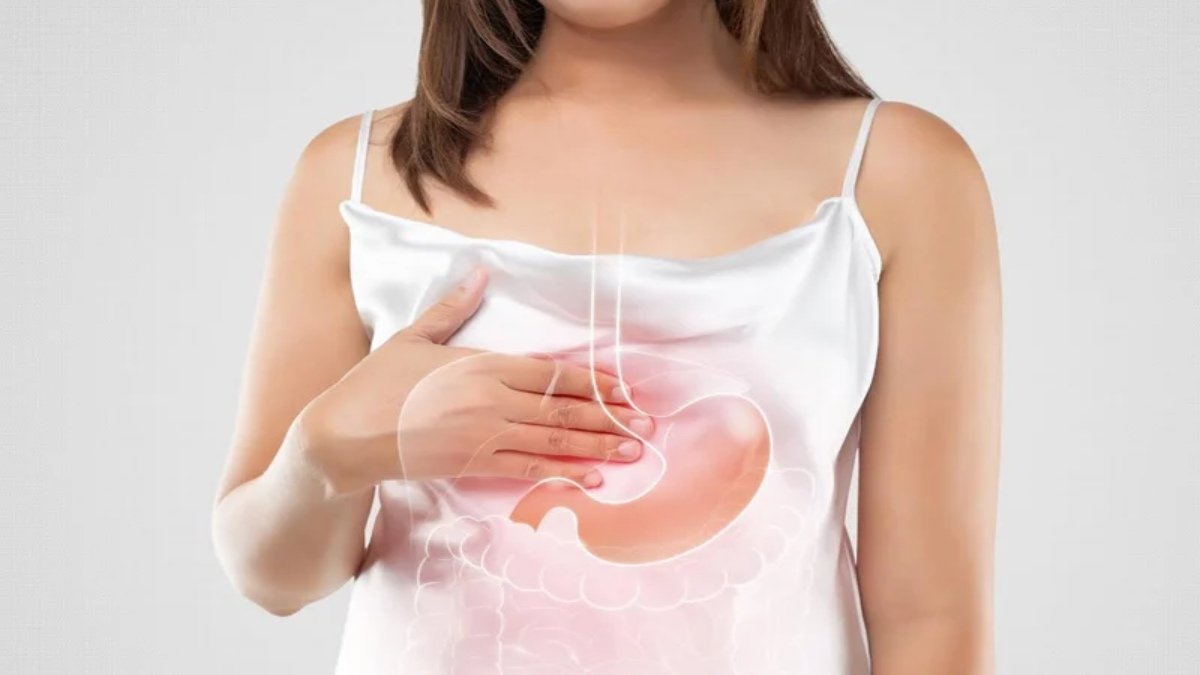Overview
Heartburn is a common discomfort that many people experience, often described as a burning sensation in the chest, just behind the breastbone.
Despite its name, heartburn has nothing to do with the heart. It occurs when stomach acid flows back into the esophagus (a tube that carries food from the mouth to the stomach).
This acid reflux irritates the lining of the esophagus, causing the characteristic burning feeling.
In this blog, we’ll explore the symptoms, causes, risk factors, complications, diagnosis, treatment, and prevention of heartburn, as well as answer some frequently asked questions about this condition.
Table of Contents
What is Heartburn?
Heartburn is a symptom of acid reflux, a condition where stomach acid backs up into the esophagus. While occasional heartburn is common and not a cause for concern, frequent heartburn may indicate gastroesophageal reflux disease (GERD), a more serious form of acid reflux.
People with GERD experience heartburn two or more times per week, which can lead to complications if left untreated.
Heartburn can last anywhere from a few minutes to several hours, and it often occurs after eating or lying down. The discomfort may also be worsened by certain foods, beverages, and lifestyle habits.
Symptoms of Heartburn
The symptoms of heartburn vary in severity and frequency but generally include:
- Burning sensation in the chest: This is the most common symptom of heartburn. It usually starts behind the breastbone and may move upward toward the throat.
- Acidic or bitter taste in the mouth: When acid backs up into the throat or mouth, it leaves a sour or bitter taste.
- Discomfort after eating: Heartburn often occurs after meals, especially large meals or foods that trigger acid reflux.
- Worsened pain when lying down: Heartburn symptoms tend to worsen when you lie down or bend over, as this position allows stomach acid to flow more easily into the esophagus.
- Regurgitation: Some people may experience a feeling of liquid or food coming back up into their throat or mouth, known as regurgitation.
Severe heartburn can sometimes be mistaken for a heart attack due to the similarity in chest pain, which is why it’s important to understand the differences between the two.
Causes of Heartburn
Heartburn is caused by acid reflux, which occurs when the lower esophageal sphincter (LES) – a muscular ring at the bottom of the esophagus – does not close properly or relaxes too often. When this happens, stomach acid can flow back into the esophagus, causing irritation.
Several factors contribute to the weakening of the LES, leading to heartburn:
- Certain foods and drinks: Spicy foods, fatty or fried foods, citrus fruits, tomatoes, chocolate, coffee, and alcohol are common triggers of heartburn.
- Large meals: Eating large portions can cause the stomach to produce more acid, increasing the likelihood of acid reflux.
- Lying down after eating: When you lie flat after eating, gravity no longer helps keep acid in the stomach, making reflux more likely.
- Obesity: Excess weight can put pressure on the stomach, forcing acid into the esophagus.
- Pregnancy: Hormonal changes during pregnancy can relax the LES, and the growing uterus can push against the stomach, causing acid reflux.
- Smoking: Smoking weakens the LES, making it easier for stomach acid to flow back into the esophagus.
- Medications: Certain medications, including aspirin, ibuprofen, and blood pressure medications, can cause heartburn by irritating the esophagus or weakening the LES.
Risk Factors for Heartburn
While anyone can experience heartburn, certain factors increase the risk of developing it more frequently:
- Diet: A diet high in spicy, fatty, or acidic foods increases the risk of heartburn.
- Age: Heartburn becomes more common with age, as the LES tends to weaken over time.
- Hiatal hernia: This condition, in which the upper part of the stomach pushes through the diaphragm into the chest, can cause acid reflux and heartburn.
- Pregnancy: Hormonal changes and the physical pressure of pregnancy increase the likelihood of heartburn.
- Lifestyle factors: Smoking, lack of physical activity, and stress can all contribute to heartburn.
Complications of Heartburn
If heartburn occurs frequently or is left untreated, it can lead to several complications:
- Esophagitis: Chronic heartburn can irritate and inflame the lining of the esophagus, leading to esophagitis. This condition can cause pain, difficulty swallowing, and ulcers in the esophagus.
- Esophageal stricture: Over time, repeated exposure to stomach acid can cause the esophagus to narrow, resulting in a condition known as an esophageal stricture. This makes swallowing difficult and may require medical intervention to stretch or dilate the esophagus.
- Barrett’s esophagus: Chronic acid reflux can lead to changes in the cells of the esophagus, a condition called Barrett’s esophagus. This is a precancerous condition that increases the risk of developing esophageal cancer.
- Esophageal cancer: While rare, chronic heartburn can increase the risk of esophageal cancer, especially in individuals with Barrett’s esophagus.
Diagnosis of Heartburn
Diagnosing heartburn typically involves a combination of a physical exam, medical history, and diagnostic tests. If your symptoms are severe or occur frequently, your healthcare provider may recommend the following tests:
- Endoscopy: A thin, flexible tube with a camera is inserted into the esophagus to check for inflammation, damage, or other abnormalities.
- Ambulatory pH monitoring: This test measures the acidity in the esophagus over a 24-hour period to determine the frequency and severity of acid reflux.
- Esophageal manometry: This test measures the strength of the LES and the muscles of the esophagus to see how well they are functioning.
- X-ray: An X-ray of the upper digestive tract may be done after swallowing a contrast liquid to get a clearer image of the esophagus, stomach, and small intestine.
Treatment of Heartburn
Heartburn treatment focuses on relieving symptoms and preventing further acid reflux. Depending on the severity of your symptoms, treatment may involve lifestyle changes, medications, or surgery.
Lifestyle Changes:
- Eat smaller meals: Instead of three large meals, try eating smaller, more frequent meals to reduce the pressure on the LES.
- Avoid trigger foods: Identify and avoid foods and beverages that trigger heartburn, such as spicy foods, chocolate, alcohol, and caffeine.
- Maintain a healthy weight: Losing excess weight can reduce the pressure on the stomach and help prevent acid reflux.
- Don’t lie down after eating: Wait at least two to three hours after eating before lying down to give your body time to digest the food.
- Elevate your head: If you experience heartburn at night, try elevating the head of your bed to keep acid from flowing back into the esophagus while you sleep.
Medications:
- Antacids: These over-the-counter medications neutralize stomach acid and provide quick relief from heartburn.
- H2 blockers: H2 blockers, such as ranitidine and famotidine, reduce the amount of acid the stomach produces, providing longer-lasting relief.
- Proton pump inhibitors (PPIs): PPIs, such as omeprazole and esomeprazole, are stronger than H2 blockers and work by blocking acid production in the stomach. They are often used for people with more severe or chronic heartburn.
- Prokinetics: These medications help strengthen the LES and improve the movement of food through the digestive tract, reducing the likelihood of acid reflux.
Surgery:
If lifestyle changes and medications do not relieve severe or chronic heartburn, surgical options may be considered. The most common procedure is fundoplication, in which the top of the stomach is wrapped around the LES to tighten it and prevent acid reflux.
Prevention of Heartburn
Preventing heartburn is often a matter of making lifestyle changes and avoiding common triggers. Here are some tips to prevent heartburn:
- Avoid trigger foods: Keep a food diary to identify and avoid foods that trigger your heartburn.
- Eat smaller meals: Large meals can cause the stomach to produce more acid, so eating smaller, more frequent meals can help prevent heartburn.
- Stay upright after eating: Don’t lie down right after eating to allow your stomach time to digest food.
- Maintain a healthy weight: Excess weight can increase pressure on the stomach, making acid reflux more likely.
- Quit smoking: Smoking weakens the LES and increases acid production, making heartburn more frequent.
- Manage stress: Stress can exacerbate heartburn, so practicing relaxation techniques and stress management can help reduce symptoms.
Conclusion
Heartburn is a common and often uncomfortable condition, but with the right lifestyle changes and treatment options, it can be effectively managed.
Whether caused by occasional overeating or chronic acid reflux, understanding the causes, symptoms, and treatment options for heartburn is key to finding relief.
If you experience frequent or severe heartburn, it’s important to consult a healthcare provider to prevent complications and ensure appropriate treatment.
By making simple adjustments to your diet and daily habits, you can take control of heartburn and improve your quality of life.
Frequently Asked Questions (FAQs)
1. Is heartburn the same as acid reflux?
Heartburn is a symptom of acid reflux, which occurs when stomach acid flows back into the esophagus. Not everyone with acid reflux experiences heartburn, but heartburn is a common indicator of acid reflux.
2. Can heartburn be a sign of a heart attack?
While heartburn and heart attacks can cause similar chest pain, they are different conditions. Heartburn typically occurs after eating or lying down, and the pain is usually located behind the breastbone. Heart attack pain is often more intense, may spread to the arm or jaw, and can be accompanied by symptoms like shortness of breath or dizziness. If you’re unsure, it’s always best to seek medical attention.
3. Can heartburn be cured?
While occasional heartburn can be managed with lifestyle changes and medications, chronic heartburn caused by GERD may require long-term treatment. In some cases, surgery may be necessary to prevent acid reflux.
4. What foods should I avoid if I have heartburn?
Common trigger foods include spicy foods, fatty or fried foods, citrus fruits, tomatoes, chocolate, coffee, alcohol, and carbonated drinks. Keeping a food diary can help you identify specific foods that trigger your heartburn.
5. When should I see a doctor for heartburn?
If you experience heartburn more than twice a week, if over-the-counter medications don’t provide relief, or if you have difficulty swallowing, chest pain, or weight loss, see a doctor for further evaluation.

